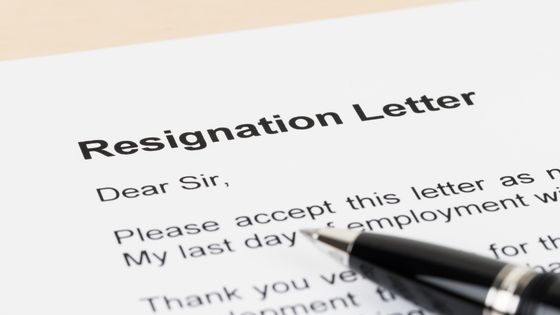You need to maintain a level of professionalism when working in the business world. This holds true even when you have decided to quit. Leaving things optimistically is in every case best. Before deciding to make a career-changing decision, you may be wondering if you need to write a letter of resignation and when. What should you do after you resign? Keep reading to get answers to these questions and learn some tips on how to write a resignation letter.
When to Write a Letter of Resignation
It’s best to give notice you are quitting whenever possible. Usually, employees should give two weeks’ notice to resign if the situation allows. However, there are some situations where it’s possible to leave without notice, such as if you have been sexually harassed, endangered, or are working in an unsafe environment.


Why It’s Smart to Write a Letter of Resignation
There are many reasons to take the time to write a resignation letter before you quit. Some reasons include:
-
It Leaves a Paper Trail
Usually, HR representatives or managers require you to provide a letter of resignation as a record-keeping measure. However, even if you don’t get asked to file one, you can still hand in one. This will help them keep track of your departure date and provide them with the necessary paperwork.
-
It’s Customary in the Business World
If you work in a certain industry or region, you’ll likely submit a letter of resignation. Since this is typically handled by your organization or region, you’ll need to ask around to verify. You can contact individuals who have left your company to see if they submitted a letter, or you can ask an HR representative discreetly.
-
It Will Help Control the “Quitting” Discussion with Your Boss
Telling your boss that you’re planning on leaving the company can be awkward. However, by sending a letter of resignation before the meeting, you can start the conversation on the right foot. This will allow your boss to thoroughly process the news before they talk with you.
-
It Helps Control the Reason Why You Left
A letter of resignation can help you keep the details of your departure accurate. For instance, if you’re worried that your boss might try to twist your departure in a way that suits them, you can send a copy of the letter to them. This will allow you to control how your boss views you and whether or not they’ll write a reference in the future.
Tips for Writing a Resignation Letter in the Business World
1. Pay Attention to the Layout
You should always write a formal resignation letter, which should include your manager’s name, the company’s address, and any other details that you want to include. Make sure to avoid spelling and grammar mistakes. You can likewise request that a friend read it for you. Your resignation should never look like an email or a text message.
2. Get to the Point
Your resignation letter should get straight to the point without being blunt. The two main points to address in your letter are that you’re leaving the company and when your last day of work will be.
3. Offer Transition Help
Make sure to offer to help your boss during the transition period. This will allow them to find a replacement quickly and easily. Make it clear that you’ll help them with the training and finding process.
4. Show Gratitude
A simple thank you letter is a great way to show appreciation for the opportunities that you were given during your time with the company. In addition to being able to write a few sentences, a few words of gratitude can also make a big difference in the letter’s overall layout.
5. Don’t Complain
Don’t try to retaliate against your former colleagues by saying something inappropriate or even worse. Even if you’re leaving on bad terms, make sure to remain professional. You should remember that your letter is on file and can be revisited if needed.
6. Control the Delivery
Today, most meetings are conducted virtually, which means that you won’t be able to give your manager a physical copy of your resignation. However, you can still send an email to your manager, along with a link to your letter. This will allow them to follow up with you and send it to the HR department.
7. Tailor the Length
Your resignation letter should be shorter in certain industries, such as law and banking. In these cases, a brief thank you and a notice period are all that are required.
Be Prepared for Feedback
Your boss might offer you a better position or more money if you resign in your letter of resignation. Before you meet with them, make sure that you have a clear understanding of what you want to achieve. If you’re presented with an offer, make sure to let them know that you’ll be back in touch with them soon with an answer.
What to Include With Your Resignation Letter
Before you send a letter of resignation, make sure that you speak with your manager in person. This will allow you to establish a clear understanding of what you’re planning on doing and how you’ll be leaving the company.
Ideally, your letter of resignation should include the following:
- Date of last work day
- A statement of resignation from your position in the company
- Your next steps and other important information
- Gratitude statement
- Signature
What to Do After Resigning
You have a couple of weeks left on your job to help the company through the transition. Before you start looking for a new job, make sure to take advantage of this time to prepare yourself.
-
Ask for a Recommendation
Before you start looking for a new job, make sure to ask your boss if they’re willing to write a letter of recommendation for you. This will allow them to have time to prepare it before you officially leave the company.
-
Assess Your Electronics
You might have a company computer or tablet, and you might want to transfer all of your personal documents and contacts to a different device. However, make sure that the company’s proprietary documents are not included. Before you start using a new device, make sure that all of your browser history and cache are cleared.
-
Create a Guide for Your Replacement
A continuity guide is a good way to organize all of the details of your upcoming replacement. It should include a list of all of your daily duties and projects, as well as any other important contacts that you might have. You might also be able to help the new hire with their training and recruitment.
-
Meet With Human Resources
During your meeting with human resources, you should talk about your various benefits, such as life insurance and health insurance. You should additionally inquire about your retirement income and your company’s 401(k). If you’re still planning on leaving the company, make sure that you have updated your phone number and address. If you’re still working, make sure that you complete all of the necessary paperwork.
-
Complete Formal Exit Interview
Before you leave the company, make sure to ask your supervisor for an exit interview. During the interview, you should share your thoughts about the position and the areas of your leadership that you would like to improve.
























